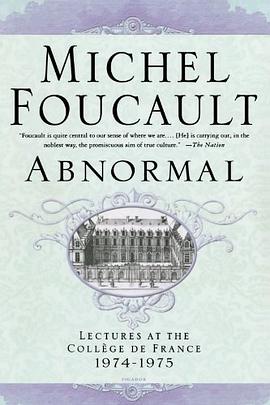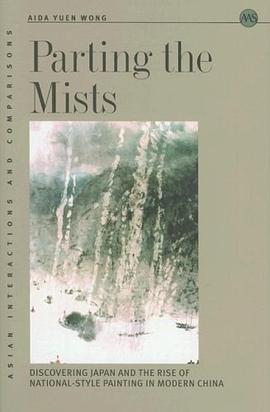Abnormal
内容简介
From 1971 until his death in 1984, Foucault gave public lectures at the world-famous College de France. Attended by thousands, these were seminal events in the world of French letters. Picador is proud to be publishing the lectures in thirteen volumes.
.
The lectures comprising Abnormal begin by examining the role of psychiatry in modern criminal justice, and its method of categorizing individuals who "resemble their crime before they commit it." Building on the themes of societal self-defense in "Society Must Be Defended," Foucault shows how and why defining "abnormality" and "normality" were preorogatives of power in the nineteenth century.
.
The College de France lectures add immeasurably to our appreciation of Foucault's work and offer a unique window into his thinking.
......(更多)
作者简介
The works of Michel Foucault include Madness and Civilization, The History of Sexuality, and Discipline and Punish.
.
Series editor Arnold I. Davidson teaches at the University of Chicago and is executive editor of the journal Critical Inquiry.
......(更多)
目录
Foreword xi
Introduction xvii
.
1 8 January 1975 1
Expert psychiatric opinion in penal cases
What kind of discourse is the discourse of expert psychiatric opinion?
Discourses of truth and discourses that make one laugh
Legal proof in eighteenth-century criminal law
The reformers
The principle of profound conviction
Extenuating circumstances
The relationship between truth and justice
The grotesque in the mechanism of power
The psychological-moral double of the offense
Expert opinion shows how the individual already resembles his crime before he has committed it
The emergence of the power of normalization
.
2 15 January 1975 31
Madness and crime
Perversity and puerility
The dangerous individual
The psychiatric expert can only have the character of Ubu
The epistemological level of psychiatry and its regression in expert medico-legal opinion
End of the antagonistic relationship between medical power and judicial power
Expert opinion and abnormal individuals (les anormaux)
Criticism of the notion of repression
Exclusion of lepers and inclusion of plague victims
Invention of positive technologies of power
The normal and the pathological
.
3 22 January 1975 55
Three figures that constitute the domain of abnormality: the human monster, the individual to be corrected, the masturbating child
The sexual monster brings together the monstrous individual and the sexual deviant
Historical review of the three figures
Reversal of their historical importance
Sacred embryology and the juridicobiological theory of the monster
Siamese twins
Hermaphrodites: minor cases
The Marie Lemarcis case
The Anne Grandjean case
.
4 29 January 1975 81
The moral monster
Crime in classical law
The spectacle of public torture and execution (la supplice)
Transformation of the mechanisms of power
Disappearance of the ritual expenditure of punitive power
The pathological nature of criminality
The political monster: Louis XVI and Marie-Antoinette
The monster in Jacobin literature (the tyrant) and anti-Jacobin literature (the rebellious people)
Incest and cannibalism
.
5 5 February 1975 109
In the land of the ogres
Transition from the monster to the abnormal (l'anormal)
The three great founding monsters of criminal psychiatry
Medical power and judicial power with regard to the notion of the absence of interest
The institutionalization of psychiatry as a specialized branch of public hygiene and a particular domain of social protection
Codification of madness as social danger
The motiveless crime (crime sans raison) and the tests of the enthronement of psychiatry
The Henriette Cornier case
The discovery of the instincts
.
6 12 February 1975 137
Instinct as grid of intelligibility of motiveless crime and of crime that cannot be punished
Extension of psychiatric knowledge and power on the basis of the problematization of instinct
The 1838 law and the role claimed by psychiatry in public security
Psychiatry and administrative regulation, the demand for psychiatry by the family, and the constitution of a psychiatric-political discrimination between individuals
The voluntary-involuntary axis, the instinctive and the automatic
The explosion of the symptomatological field
Psychiatry becomes science and technique of abnormal individuals
The abnormal: a huge domain of intervention
.
7 19 February 1975 167
The problem of sexuality runs through the field of abnormality
The old Christian rituals of confession
From the confession according to a tariff to the sacrament of penance
Development of the pastoral
Louis Habert's Pratique du sacrament de penitence and Charles Borromee's (Carlo Borromeo) Instructions aux confesseurs
From the confession to spiritual direction
The double discursive filter of life in the confession
Confession after the Council of Trent
The sixth commandment: models of questioning according to Pierre Milhard and Louis Habert
Appearance of the body of pleasure and desire in penitential and spiritual practices
.
8 26 February 1975 201
A new procedure of examination: the body discredited as flesh and the body blamed through the flesh
Spiritual direction, the development of Catholic mysticism, and the phenomenon of possession
Distinction between possession and witchcraft
The possessions of Loudon
Convulsion as the plastic and visible form of the struggle in the body of the possessed
The problem of the possessed and their convulsions does not belong to the history of illness
The anti-convulsives: stylistic modulation of the confession and spiritual direction; appeal to medicine; recourse to disciplinary and educational systems of the seventeenth century
Convulsion as neurological model of mental illness
.
9 5 March 1975 231
The problem of masturbation between the Christian discourse of the flesh and sexual psychopathology
Three forms of the somatization of masturbation
The pathological responsibility of childhood
Prepubescent masturbation and adult seduction; the offense comes from outside
A new organization of family space and control: the elimination of intermediaries and the direct application of the parent's body to the child's body
Cultural involution of the family
The medicalization of the new family and the child's confession to the doctor, heir to the Christian techniques of the confession
The medical persecution of childhood by means of the restraint of masturbation
The constitution of the cellular family that takes responsibility for the body and life of the child
Natural education and State education
.
10 12 March 1975 263
What makes the psychoanalytic theory of incest acceptable to the bourgeois family (danger comes from the child's desire)
Normalization of the urban proletariat and the optimal distribution of the working-class family (danger comes from fathers and brothers)
Two theories of incest
The antecedents of the abnormal: psychiatric-judicial mesh and psychiatric-familial mesh
The problematic of sexuality and the analysis of its irregularities
The twin theory of instinct and sexuality as epistemologico-political task of psychiatry
The origins of sexual psychopathology (Heinrich Kaan)
Etiology of madness on the basis of the history of the sexual instinct and imagination
The case of the soldier Bertrand
.
11 19 March 1975 291
A mixed figure: the monster, the masturbator, and the individual who cannot be integrated within the normative system of education
The Charles Jouy case and a family plugged into the new system of control and power
Childhood as the historical condition of the generalization of psychiatric knowledge and power
Psychiatrization of infantilism and constitution of a science of normal and abnormal conduct
The major theoretical constructions of psychiatry in the second half of the nineteenth century
.
Psychiatry and racism: psychiatry and social defense
Course Summary 323
Course Context 331
Index of Notions and Concepts 357
Index of Names 369
......(更多)
读书文摘
从这个时候起,形成或制造了一系列的新对象,它们同时属于灵魂和肉体的范畴,是快乐的形式、快乐的模式。这样,人们从肉体是所有罪恶之源的主题过渡到这样的观念,即在所有的过错中都有贪欲。(⋯⋯)从16世纪起,围绕着这些忏悔坦白的程序,有一种身体(corps)和肉体(chair)的一致化,如果你们愿意,就是一种身体的肉体化和肉体的身体化,(⋯⋯)
......(更多)






